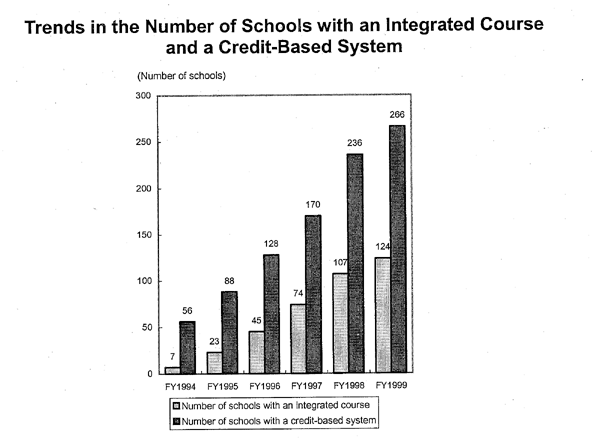| Home > Policy > White Paper, Notice, Announcement > White Paper > Japanese Government Policies in Education, Science, Sports and Culture1999 > Part2 Q25 | ||
A:At integrated course and credit-based uppersecondary schools,each student considerstheir own future,chooses courses that matchtheir own future direction and interests andstudies at their own pace.
| What are"integrated courses"? |
Integrated courses were introduced from FY1994 as a third set of courses in addition to general courses which focus on general subjects,such as Japanese and Mathematics,and special-ized courses which focus on specialized subjects,such as Industry and Commerce.With integrated courses,students themselves can choose wide range of elective subjects in general and specialized areas in line with their interests,and study in a way that allows them to discover their own individuality through upper secondary school life and consider their future lives and careers.Measures to facilitate this in-clude the establishment of a subject that gives guidance and assistance in establishing a learn-ing plan,called'Industrial Society and Human Beings,' and the enhancement of guidance.In addition,integrated courses focus on learning in which students find out answers for themselves by setting their own topics and car-rying out research by themselves to enable them to develop study skills and give them the desire to continue studying in the future.The credit-based system-explained below-is used in integrated courses.As of FY1999,integrated courses had been established in124schools nationwide.

| What is the"credit-based system"? |
The credit-based system is a system in which students graduate if they gain the required num-ber of credits between entering school and graduation with no classification of school into years,such as jst year and2nd year.It was intro-duced for day/evening courses and correspon-dence courses from FY1988 and also for full-day courses from FY1993.Under this system,apart from compulsory subjects,students create their own timetable and can choose to study subjects that match their interests on days and at times when they want to.Under the"credit-based system",there are no school years;thus there is no repeating of years.The system has other special features.For ex-ample,students who have studied at upper sec-ondarty school in the past and gained credits may include those credits as part of the credits re-quired to graduate.As of FY1999 the credit-based system had been adopted by266schools nationwide,in-cluding integrated courses.These systems were created to widen the scope of learning choices in order to enhance the individu-ality of each student.MESSC's present objective is to promote the establishment of at least one school with an integrated course system by prefectures in each school zone(about500nationwide).
<T went on to university> I think that I have become very positive through my school life in the integrated course.A bigfactor was that because I chose subjects myself,I was aware that I would not make any progresswithout using my"individuality". <K went on to a professional training college> I was able to gain a broad experience of the technical subjects that I was most interested inthrough the integrated course,and when I thought about my future,I wanted to pursue my inter-ests so I decided to go to a professional training college. <H started work> There were many opportunities to gain all kinds of qualifications in the integrated course,whichwas very useful when looking for a job,but most importantly learning by deciding my own cur-riculum gave me confidence in myself in being able to do a job. |
| Back to Top | MEXT HOME |